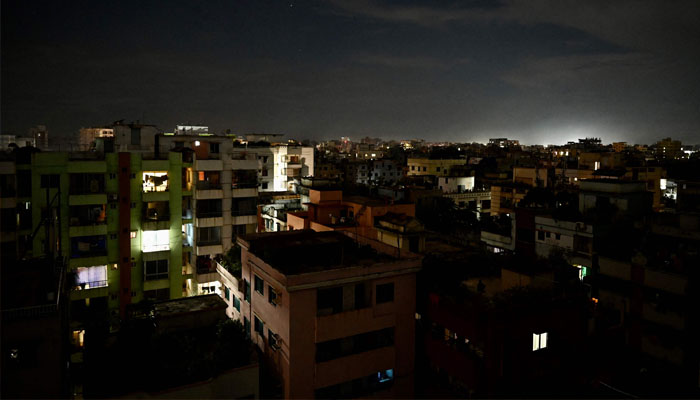Blackout in Bangladesh: Grid failure plunges 130m people into darkness
Bangladesh suffered a major power crisis in recent months as a result of higher global energy prices
DHAKA: An unexplained grid failure left over 80 percent of the population of Bangladesh, or 130 million people, without power for several hours on Tuesday, officials said.
Bangladesh has suffered a major power crisis in recent months as a result of higher global energy prices following Russia’s invasion of Ukraine, and has imposed regular cuts to conserve electricity.
But it remained unclear what caused Tuesday’s unscheduled blackout, which hit more than 80 percent of the country shortly after 2:00 pm (0800 GMT), according to the Power Development Board.
Spokesman Shamim Ahsan said that apart from some locations in Bangladesh’s northwest, the rest of the country was without power, affecting at least 130 million people. As night fell, the normally brightly lit streets of central Dhaka, home to more than 22 million people, and other cities were in the dark on Tuesday evening.
Another official said later that only 60 percent of the poor country, which is home to factories supplying garments for Western brands, had been affected. “By 9:00 pm power had been restored in the entire country,” A.B.M Badruddoza, spokesman of the state-run power grid company said.
Ahsan said it remained unclear what had caused the fault. “It is still under investigation,” he said, adding that a technical malfunction was the probable cause. A depreciating currency and dwindling foreign exchange reserves left Bangladesh unable to import sufficient fossil fuels, forcing it to close diesel plants and leave some gas-fired power stations idle.
The government imposed lengthy power cuts to conserve existing stocks in July, with outages lasting up to 13 hours a day at their peak. The blackouts sparked widespread public anger and helped mobilise large demonstrations on the streets of Dhaka.
At least three protesters were killed by security forces during the rallies, partly motivated by rising cost-of-living pressures. Around 100 others were injured during a police crackdown on one demonstration, according to the opposition Bangladesh Nationalist Party.
-
 Andrew Mountbatten Windsor Faces Future With UK MPs, Says Expert
Andrew Mountbatten Windsor Faces Future With UK MPs, Says Expert -
 Shamed Andrew Told 'nobody Is Above The Law' Amid Harrowing Silence
Shamed Andrew Told 'nobody Is Above The Law' Amid Harrowing Silence -
 Gisele Bundchen Melts Hearts With Sweet Bike Ride Glimpse Featuring Son
Gisele Bundchen Melts Hearts With Sweet Bike Ride Glimpse Featuring Son -
 Prince William Found Meghan Markle ‘quite Refreshing’ At Start
Prince William Found Meghan Markle ‘quite Refreshing’ At Start -
 Kate Middleton Knew Should Could Not Be ‘voice Of Reason’ With Prince Harry
Kate Middleton Knew Should Could Not Be ‘voice Of Reason’ With Prince Harry -
 Rihanna Has Wardrobe Malfunction At A$AP Rocky Fashion Show
Rihanna Has Wardrobe Malfunction At A$AP Rocky Fashion Show -
 Prince Harry Felt System Had ‘one Rule For Him, One For Prince William’
Prince Harry Felt System Had ‘one Rule For Him, One For Prince William’ -
 Jake Paul's Fiancée Sends Him Over The Moon Over Stunning Victory
Jake Paul's Fiancée Sends Him Over The Moon Over Stunning Victory -
 Harper Beckham Sends Valentine’s Love Amid Brooklyn Family Drama
Harper Beckham Sends Valentine’s Love Amid Brooklyn Family Drama -
 Why Prince William, Kate Middleton 'partnership' Is Important For Monarchy
Why Prince William, Kate Middleton 'partnership' Is Important For Monarchy -
 Katie Price Drama Escalates As Family Stays In Touch With Ex JJ Slater
Katie Price Drama Escalates As Family Stays In Touch With Ex JJ Slater -
 Critics Target Palace Narrative After Andrew's Controversy Refuses To Die
Critics Target Palace Narrative After Andrew's Controversy Refuses To Die -
 Sarah Ferguson’s Delusions Take A Turn For The Worse: ‘She’s Been Deserted’
Sarah Ferguson’s Delusions Take A Turn For The Worse: ‘She’s Been Deserted’ -
 ICE Agents 'fake Car Trouble' To Arrest Minnesota Man, Family Says
ICE Agents 'fake Car Trouble' To Arrest Minnesota Man, Family Says -
 Camila Mendes Reveals How She Prepared For Her Role In 'Idiotka'
Camila Mendes Reveals How She Prepared For Her Role In 'Idiotka' -
 China Confirms Visa-free Travel For UK, Canada Nationals
China Confirms Visa-free Travel For UK, Canada Nationals




